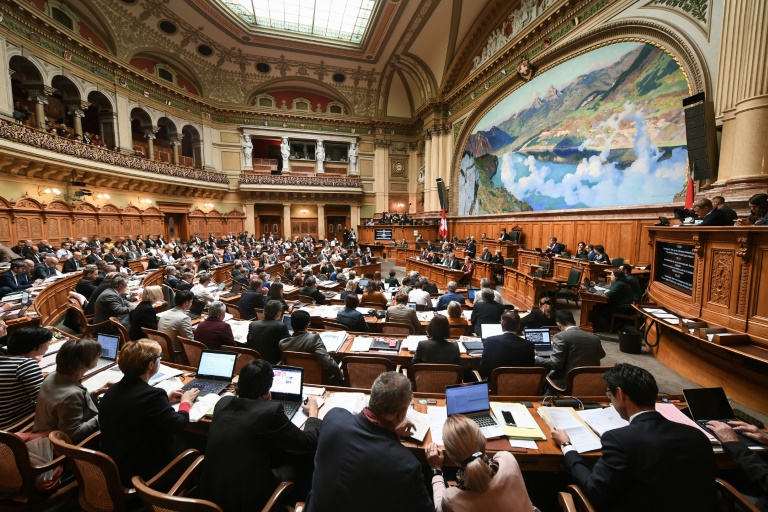
Switzerland is electing members of the House of Representatives and the Senate for the next four years (Photo: AFP)
Switzerland was counting votes on Sunday in an election that could see unprecedented gains for parties demanding bold climate action and a possible slip for the anti-immigrant right-wing.
In a country that recently held a funeral march for an iconic glacier that has nearly vanished due to melting, opinion polls indicate that climate change has displaced migration as the top concern among the electorate.
That marks one of the most significant shifts in recent Swiss political history, according to the Sotomo political research institute, which forecast that Sunday's results could generate a "green wave."
The Swiss People's Party (SVP), which has repeatedly been accused of demonising migrants, is poised to remain the largest parliamentary party however, with pre-vote surveys giving it over 27 percent support in the wealthy Alpine nation.
But that is down from the 29 percent the SVP garnered in 2015.
University of Lausanne political scientist Oscar Mazzoleni told AFP that "even a loss of two to three percent would be a failure" for the SVP.
The Green Party, which won a little more than seven percent in 2015, is now backed by nearly 11 percent of voters, according to a poll released this month by public broadcaster RTS.
Meanwhile, the Green Liberals -- an environmentalist party with libertarian socio-economic policies -- has also seen its fortunes rise, with the RTS poll giving it over seven percent support, compared with less than five percent four years ago.
Even if the Greens do not manage to secure a cabinet seat, parties currently in government have pledged to do more to combat climate change, except for the SVP which has denounced "climate hysteria" in Swiss politics.
Polls nationwide closed at midday, although an overwhelming majority of Swiss had already cast ballots by mail.
Provisional results were expected on Sunday evening.
'Magic formula'
If the environmentalist parties match or outperform their poll numbers, they could, through an alliance, force their way into the executive branch for the first time.
Under Switzerland's unique political system, the election decides the 200 lower house lawmakers and 46 senators elected to four-year terms, but the make-up of the executive Federal Council will not be decided until December.
The country's so-called "magic formula" sees the council's seven cabinet positions divided among the four leading parties.
Currently, six cabinet seats are shared equally between the SVP, the Socialist Party and the right-leaning Free Democratic Party, with the centrist Christian Democrats holding the seventh seat.
The presidency rotates each year.
Analysts have questioned whether an environmental alliance could join the cabinet, in part because there is no guarantee that the leftwing Greens and the libertarian Green Liberals could agree on a candidate.
But Green Party vice president Lisa Mazzone told AFP that, given the severity of the climate emergency, her bloc intends to be "a force" in the executive.
On top of the funeral held for the Pizol glacier last month, a study by Zurich's ETH university found that more than 90 percent of 4,000 glaciers dotted throughout the Alps could disappear by the year 2100 if greenhouse gas emissions are not curbed.
'Dormant electorate'
Turnout in Swiss national elections has not exceeded 50 percent since 1975, prompting some political observers to joke that abstainers have been the country's largest bloc for more than four decades.
Mazzone said the Green strategy has relied on mobilising "a dormant electorate" by targeting young people who have avoided politics but are increasingly worried about climate change.
The Sotomo institute agreed that many young people are voting for the first time in 2019, with much of their support likely going to the Greens.
In contrast, the populist SVP has seen its support recede owing to "the growing age of its electoral base," not because backers have defected to other parties, Sotomo said.


